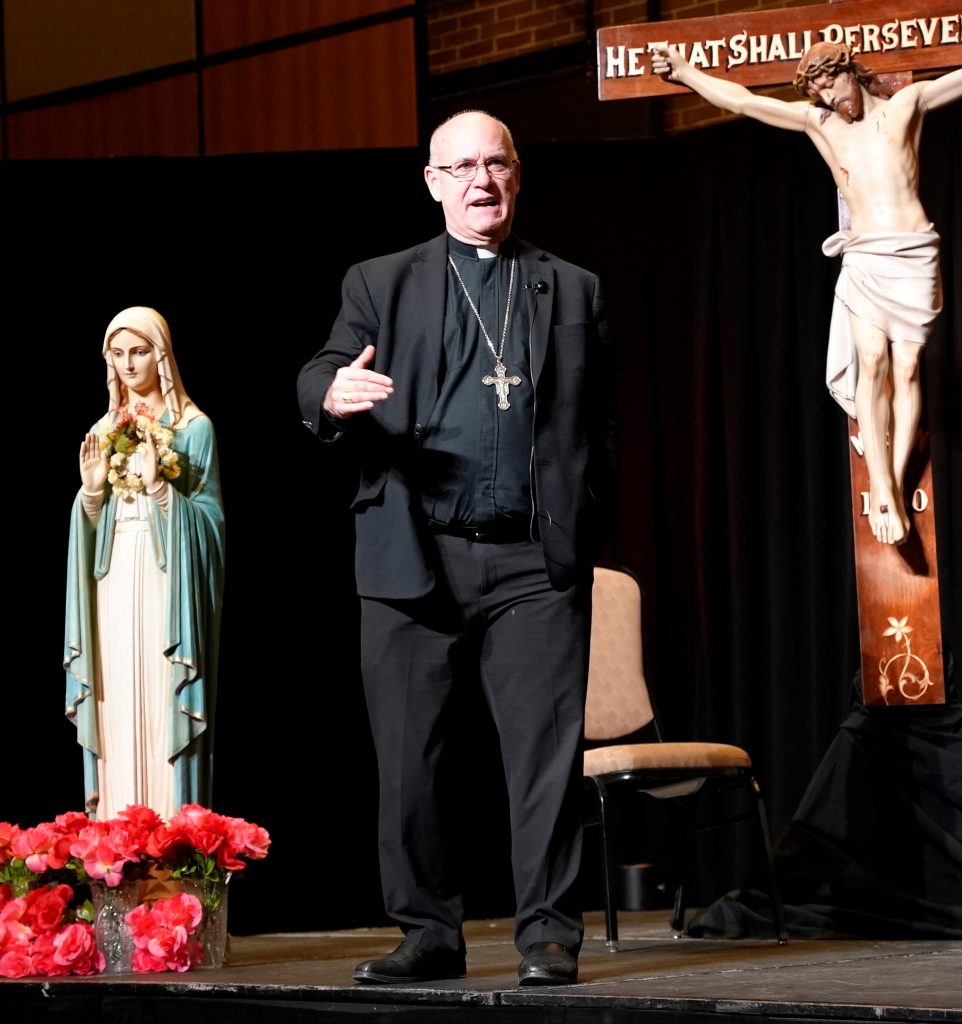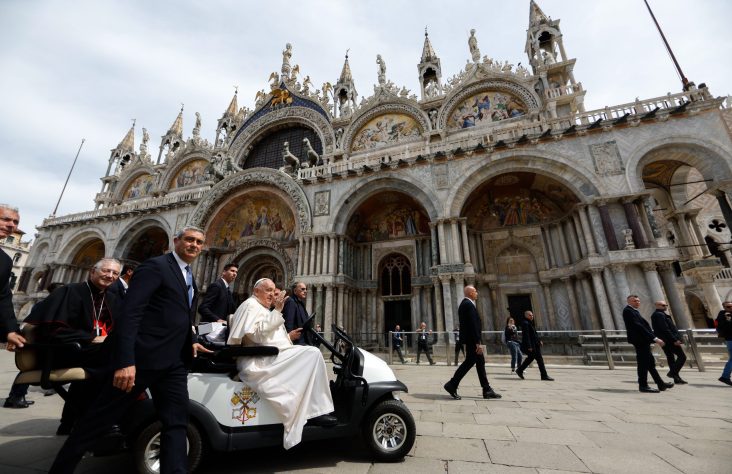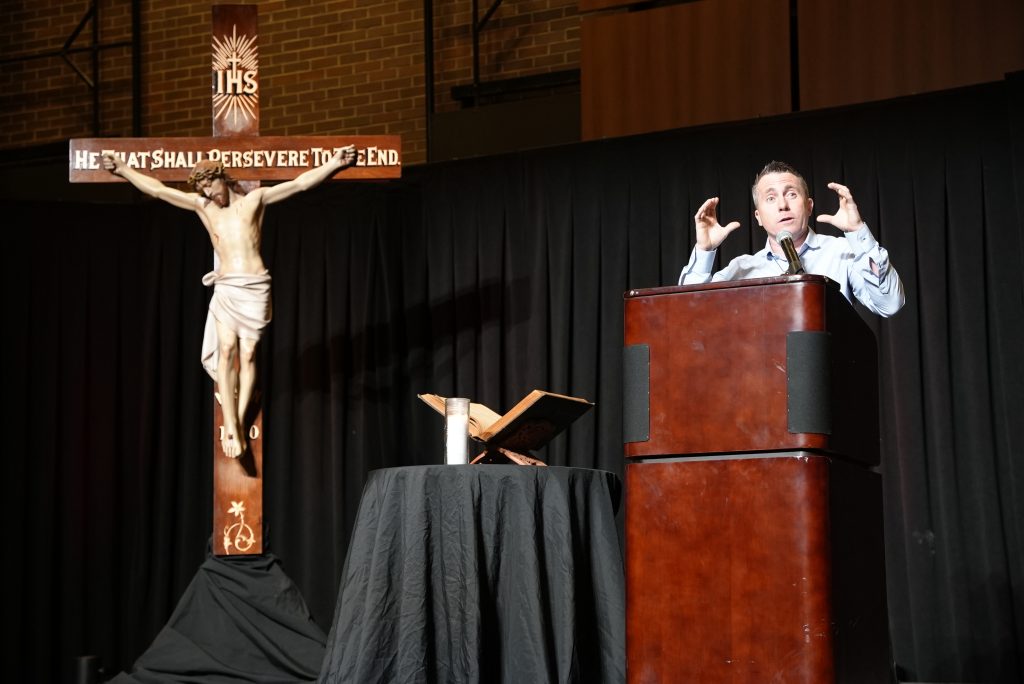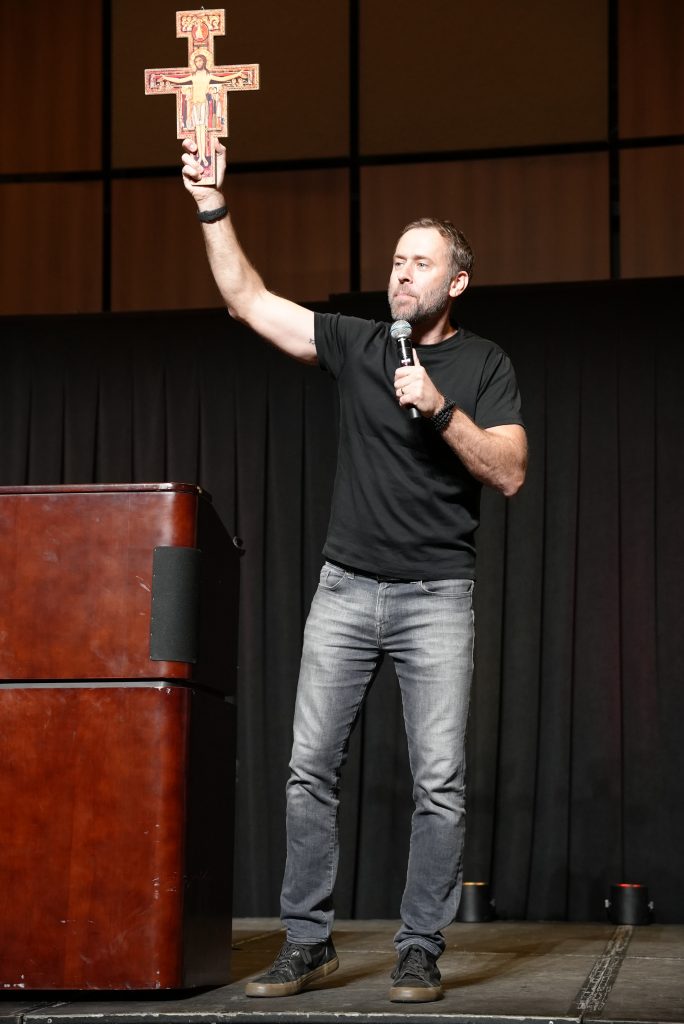February 21, 2023 // Bishop
Men Seek to Rekindle the Flame of Christ in Their Hearts at Conference
Even the brightest of fires cannot burn forever. Only those that are properly rekindled will blaze as beacons of light and help dispel the darkness.
Fueled by this desire, 750 men from across the Diocese of Fort Wayne-South Bend gathered at the Century Center in South Bend on Feb. 18. The 12th annual Rekindle the Fire men’s conference was an opportunity for men to refocus
their lives on the Lord and strengthen the flame of Christ that burns within their hearts. To help achieve this, the conference offered an impressive lineup of internationally-renowned Catholic speakers, as well as adoration, confession, and Mass with Bishop Rhoades.

Photos by Eric Peat
A gathering of 750 men unite to reignite their spark for God and their faith at the Century Center in South Bend for the Rekindle the Fire men’s conference on Saturday, Feb. 18.
The event began with a bible enthronement and welcoming comments from the Masters of Ceremonies, Father Dan Koehl of St. Charles Borromeo in Fort Wayne and Father Stephen Felicichia of St. Elizabeth Ann Seton in Fort Wayne. The priestly pair mixed in both playful banter and prayerful encouragement throughout the day.
The first speaker of the conference was Paul J. Kim, a speaker, musician, and comedian. Kim told the story of his full immersion into the Catholic faith when, at age 19, he finally came clean in the sacrament of penance by confessing the sins he had been hiding for years. “A lifetime worth of sin was washed away in a single moment by the blood of Christ,” explained Kim. “Brothers, we cannot compete with the mercy of God.” Moved by the Lord, Kim then attended Mass, where he began “ugly crying” during the consecration and hid. “As I crawled out from under the pew, I realized for the first time in my life that that’s Jesus Christ,” Kim said of the consecrated host. “It was ‘game on.’”
From there, Kim related the lives of several saints to the men in attendance, highlighting the struggles with sin that they each faced and stressing that no sin can disqualify one from becoming a saint. “You are not the sum of your sins,” Kim said. “You are the sum of God’s love for you.” Kim ended his talk by walking men through a powerful visualization of encountering and embracing Jesus, who meets us and loves us despite our sins.
Next, speaker and author Jason Evert delivered a message of living purity and chastity in a lust-filled world. Evert began by offering practical advice for men in moments of temptation: stop and make the sign of the cross, with each motion of the hand prompting quick prayers of gratitude, contrition, intercession, and adoration. Despite the temptation of lust facing young men, Evert stressed that this didn’t stop God from choosing St. Joseph as the ultimate model for chastity. “God took the most beautiful woman who ever existed, and to guard her purity and innocence, he chose a college-aged guy,” Evert said of Joseph. “Joseph’s love for Mary didn’t threaten her virginity; it safeguarded it.”
Evert went on to share tips on dating — both before and after marriage — and parenting from a Catholic perspective. He challenged the men to initiate love and reconciliation in their relationships, even when children continually push boundaries. “Kids won’t always obey us, but they will imitate us,” Evert admitted. “It’s especially potent for kids to see their parents in line for confession.” He also encouraged men to seek out fellowship and stay close to Christ in the blessed sacrament.
After lunch and breakout sessions featuring the event’s speakers addressing specific topics, author and speaker Christ Stefanick spoke on living joy. He shared four keys to achieving this, the first of which is giving thanks in all things — simple things, like the gift of each day, to difficult things, like those that trigger us to anger. “Gratitude is the key that will unlock the smile from your face,” said Stefanick. The second key is loving yourself, as Christ loved each person enough to die for them. We must preach truth to ourselves, Stefanick said, and “wake up to the fact that there’s a battle between heaven and hell, the frontline is between your ears, and you need to pick sides.”
The third and fourth keys are making strong, faithful friends and framing your mind with faith. True joy, according to Stefanick, is not about burying our heads in the sand, pretending that nothing’s wrong, and ignoring the pain of life. True joy is what gives us the strength to feel that pain. Stefanick ended his talk with a battle cry for all men: “The Church needs you, the world needs you, and the joy of the Lord must be your strength today!”
The compelling witnesses that the speakers shared left an impression on the men at the conference, many of whom felt galvanized by the small group discussions after each talk.
“One of the great values of these conferences is hearing the speakers talk of their personal experiences in a room with other men,” said Deacon Joe Dietz of Christ the King in South Bend. “We can share things because guys can relate personally with other guys. Meeting with a smaller group of men is a source of encouragement, and it’s bearing fruit in our lives.”
“The power of coming together as a group inspired me to move,” echoed Jacob Kaizer, parishioner at Our Lady of Good Hope in Fort Wayne. “It made me want to take action to improve my relationships and better my life.”
And if just a spark can ignite a fire, these men can set the diocese ablaze for Christ.
Bishop Shepherds His Flock at Rekindle the Fire
Every Bishop is called by the Lord to shepherd his flock, serving God’s people humbly and leading them to Christ. The Diocese of Fort Wayne-South Bend has such a shepherd in Bishop Kevin C. Rhoades, who spent his afternoon on Saturday, Feb. 18, with the men of Rekindle the Fire. By educating men on the significance of the Eucharist, answering questions on faith and morals, and celebrating the sacrifice of the Mass, Bishop Rhoades effectively provided his flock with spiritual nourishment for the road ahead.

Eric Peat
Bishop Rhoades addresses the men at the Rekindle the Fire men’s conference at the Century Center in South Bend on Saturday, Feb. 18.
In his opening remarks, Bishop Rhoades provided an update on the National Eucharistic Revival. The first year of the three-year event, which began in our diocese with the Eucharistic Procession and Festival last June, is focused on equipping leaders at the diocesan level. This will be followed by a Parish Year, which kicks off this June and is designed to foster Eucharistic devotion at the parish level. These two years culminate in July of 2024 with a National Eucharistic Congress in Indianapolis. Four separate Eucharistic processions — one each from Minnesota, Connecticut, Texas, and California — will form a pilgrimage that converges at this congress.
For Bishop Rhoades, the Eucharistic Revival reinforces what has been at the core of his being since his time in the seminary, when he was fortunate enough to serve at Mass with Pope St. John Paul II.
“When we were in the sacristy before Mass, he looked me in the eye and said, ‘Be sure to make the Eucharist the center of your life,’” recalled Bishop Rhoades. “I will never forget that advice, because through the Eucharist, we grow in relationship with the Lord; we receive the strength to be his disciples and to follow him. God is calling you to be men of the Eucharist — not only to be devoted to the Eucharist, but also to live the Eucharist, living lives of sacrificial love.”
Bishop then held a question-and-answer session, answering questions that had been submitted by men in the audience throughout the day and presented by the event’s masters of ceremony, Fathers Dan Koehl and Stephen Felicichia. These questions covered a variety of topics, from what attributes are needed most to be a true man to the necessity of confession despite the forgiveness of venial sins at Mass.
One question that prompted a thoughtful response had to do with how Catholics are to receive communion: on the tongue versus in the hand and standing versus kneeling. Bishop said that while receiving the Eucharist on the tongue and in the hand are both acceptable, the focus should instead be on reverence. The most important aspect of receiving communion, according to Bishop, is the “disposition of the heart” and that we do so in a state of grace. Bishop added that kneeling has different meanings in different cultures — some regard it as a penitential act while others as a symbol of adoration — but assured that no one will be denied communion because of choosing to kneel.
When asked about the greatest cultural threats to our diocese, Bishop referenced individualism, or the belief that people can pray by themselves without a need to go to church. He also named secularism, in which individuals do not center their lives on God but instead “seek to relegate religion to the peripheries.” Finally, Bishop spoke of relativism, the belief that there is no objective right or wrong. Bishop combated this principle with the Church’s stance on “the compatibility of faith and reason.” It is on these two wings, Bishop said, that “we can arrive at the truth.”
Bishop Rhoades was also asked about how to guard youth from the dangers of social media. “We have to step up our game,” he stated succinctly. “We have to make sure faith is being lived at home, make sure that our youth encounter Jesus and have a personal relationship with Him.” Parents can help achieve this, Bishop said, through praying as a family, talking about faith and what it means to them, and being models of goodness.
The largest reaction came when Bishop was asked if public figures supporting initiatives that are directly opposed to Church teaching should receive communion. Although Bishop stated that clergy cannot know the state of one’s soul when he or she comes forward to receive the Eucharist, Canon Law dictates that those who “obstinately persist and manifest grave sin” are not to be admitted to Holy Communion.
“Those who actively promote the killing of the unborn — should they be admitted to Holy Communion? No,” Bishop said to much applause, while making it clear that such figures must first be given every opportunity to cease such behavior. “The controversy arises because some bishops are not enforcing this, and some are.”
The evening concluded with Bishop celebrating Mass with the men in attendance. As his flock departed and dispersed across the diocese, many reflected on the selfless and steadfast nature of their shepherd.
“I think it’s important that Bishop Rhoades is here,” said Travis Dexter, a parishioner at St. Mary’s of the Lake in Culver. “It’s important that he makes himself available for us to ask him questions. I find that refreshing.”
“It shows he’s putting his personal stamp of approval on this conference,” agreed Deacon Joe Dietz of Christ the King Parish in South Bend. “Clearly his presence here shows his commitment not only to Christ, but also to the men of the diocese.”
The best news. Delivered to your inbox.
Subscribe to our mailing list today.










